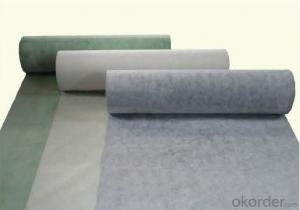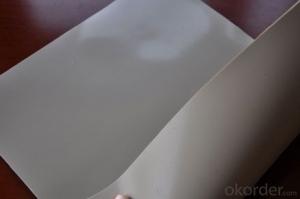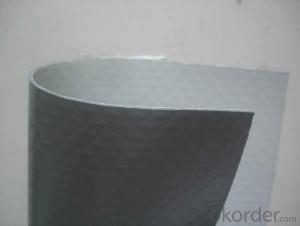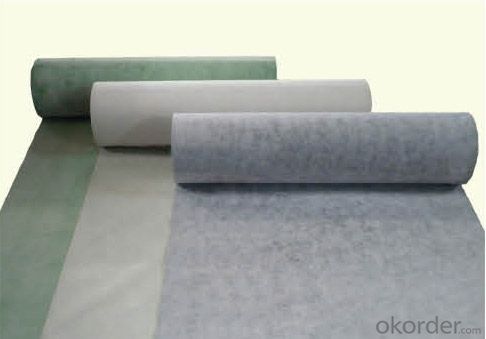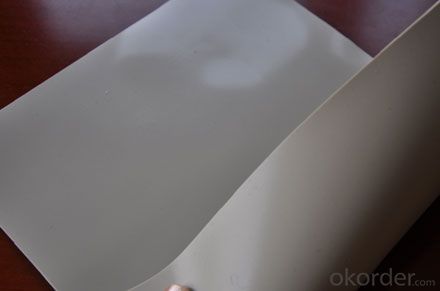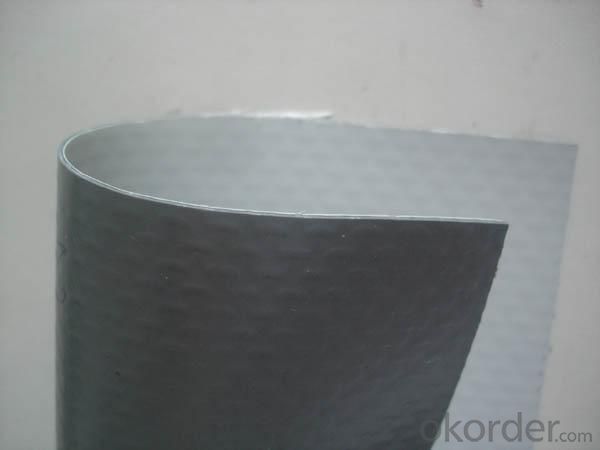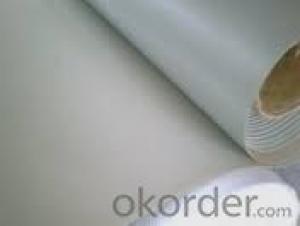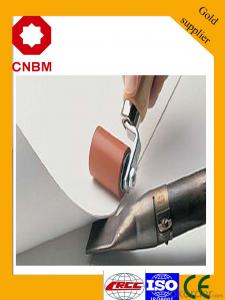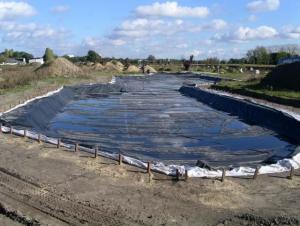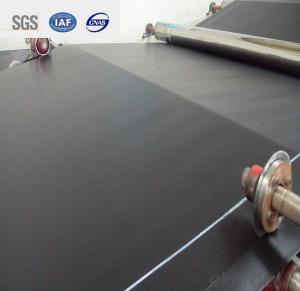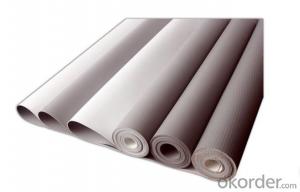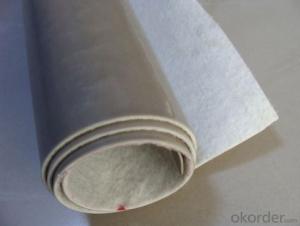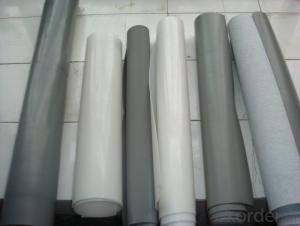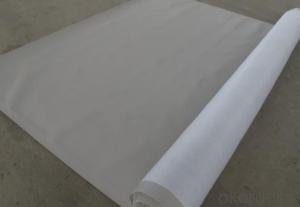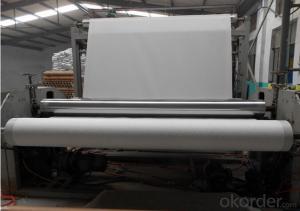Polyvinyl Chloride Coated Waterproof Membrane
- Loading Port:
- China main port
- Payment Terms:
- TT OR LC
- Min Order Qty:
- 5000 m²
- Supply Capability:
- 100000 m²/month
OKorder Service Pledge
OKorder Financial Service
You Might Also Like
Specification of PVC Waterproofing Membrane
Length | 20m/roll or customized |
Width | 2.05m |
Thickness | 1.2mm; 1.5mm; 2.0mm |
Type | Homogeneous, Reinforced, Fabric back |
If Exposed | Exposed and Non-exposed |
Color | White, Grey or customized |
Introduction of PVC Waterproofing Membrane
Polyvinyl Chloride (PVC) waterproof membrane is a new polymer waterproof membrane which is made from polyvinyl chloride resin, and mixed with plasticizer, filler, antioxygen, ultraviolet absorber and other auxiliaries.
Advantages of PVC Waterproofing Membrane
1. Lower cost for installation and maintaining than other material
2. Easy installation and good connection
(Short installation period, easy to be connected with other buildings)
3. Water-proof, anti-leakage and anti-UV
4. Long time-lasting for use, anti-aging and strong self-clean ability
5. Good weather resistance and high tearing strength
(Resist against 12 grade typhoon)
6. For different weight, width, colours and thickness, we can arrange as special requirement.
Used for the tent of outdoor exhibition hall and canopy of overpass.
Character: waterproof, PVC coated, easy installation
FAQ of PVC Waterproofing Membrane
a.Can we get some samples before place order?
Answer: We can send the free samples to you by freight collect.
b.How many years can your PVC membrane guarantee?
Answer: We will guarantee the quality for 5 years at least.
c.Which countries you ever export the product?
Answer: We export the PVC membrane to South Africa, Middle east and even European countries.
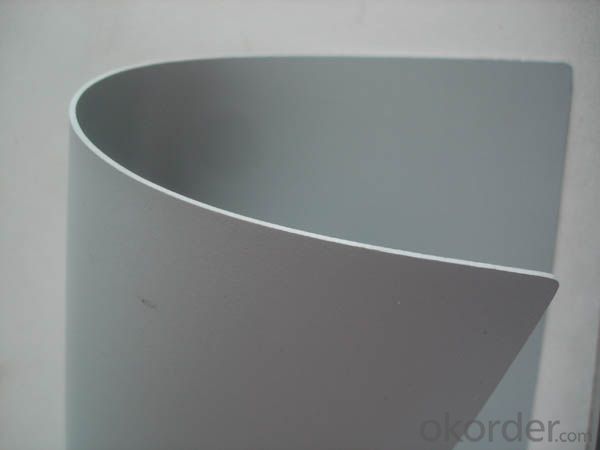
- Q: Can a waterproofing membrane prevent water leakage in basements?
- Yes, a waterproofing membrane can prevent water leakage in basements. A waterproofing membrane is a protective layer that is applied to the exterior or interior walls of a basement to create a barrier against water penetration. It can effectively prevent water from seeping through the foundation walls and causing leaks or moisture issues in the basement. The membrane acts as a waterproof seal, preventing water from entering the basement and protecting the structure from potential damage. However, it is important to note that the effectiveness of a waterproofing membrane depends on its proper installation and maintenance.
- Q: What are the requirements for the storage of waterproofing membranes?
- Waterproof membranes are generally flammable, so the storage area prohibits fireworks.
- Q: Can a waterproofing membrane be used on both horizontal and vertical surfaces?
- Yes, a waterproofing membrane can be used on both horizontal and vertical surfaces. Waterproofing membranes are designed to create a barrier against water penetration, regardless of the surface orientation.
- Q: Are waterproofing membranes suitable for balconies and terraces?
- Yes, waterproofing membranes are suitable for balconies and terraces as they provide an effective barrier against water infiltration, protecting the underlying structure from potential damage caused by moisture.
- Q: Does a waterproofing membrane require any curing time?
- Indeed, a curing time is typically necessary for a waterproofing membrane to fully bond and establish a robust, impermeable barrier. The duration of this curing period can differ based on the type of membrane employed and the instructions provided by the manufacturer. While the membrane is undergoing the curing process, precautions should be taken to shield it from foot traffic, water exposure, and any other potential sources of harm. Adhering to the recommended curing time is crucial in guaranteeing the membrane's effectiveness and durability.
- Q: Can a waterproofing membrane be used on aerated concrete block surfaces?
- Yes, a waterproofing membrane can be used on aerated concrete block surfaces. Aerated concrete blocks are known for their porous nature, which can make them prone to water penetration. Applying a waterproofing membrane on the surface of the blocks can help prevent water from seeping through and causing damage. The membrane forms a barrier that keeps water out while still allowing the blocks to breathe and release any trapped moisture. This helps to maintain the integrity and longevity of the aerated concrete block structures. However, it is important to ensure that the waterproofing membrane is specifically designed for use on aerated concrete blocks, as different materials require different types of membrane for optimal performance.
- Q: Where are waterproofing membranes commonly used?
- Waterproofing membranes are commonly used in construction, particularly in areas such as basements, roofs, foundations, and bathrooms, where protection against water infiltration and moisture is crucial.
- Q: Can waterproofing membranes be used on bridge decks?
- Bridge decks can benefit greatly from the application of waterproofing membranes. Due to the constant exposure to harsh weather conditions like rain, snow, and freeze-thaw cycles, the concrete and steel reinforcement of bridge decks can deteriorate. Waterproofing membranes are specifically designed to counter water infiltration and safeguard the bridge deck against damage caused by moisture. Typically composed of flexible materials like bitumen, PVC, or EPDM rubber, these membranes are directly applied to the surface of the bridge deck. Acting as a barrier, they prevent water from seeping into the concrete and causing corrosion of the reinforcement. They also help minimize crack formation and extend the lifespan of the bridge deck. Furthermore, the effectiveness and durability of waterproofing membranes can be enhanced by combining them with other protective coatings or systems. All in all, the utilization of waterproofing membranes on bridge decks is a widely employed and successful approach to ensure the long-term integrity and functionality of the structure.
- Q: What is the difference between pressure-sensitive self-adhesive waterproofing membrane and sbs asphalt waterproofing membrane?
- 2, from the construction method (1) pressure-sensitive self-adhesive waterproof membrane is the use of wet shop method, that is, the base surface and the membrane should engage in cement slurry, and finally, the shop on it. And sbs asphalt waterproofing membrane using the roasted method, quite troublesome. So from the construction method, the two differences are relatively large, the former construction more convenient.
- Q: Can a waterproofing membrane be used for pond or pool applications?
- Yes, a waterproofing membrane can be used for pond or pool applications. These membranes are specifically designed to create a water-tight barrier, making them suitable for preventing leaks and ensuring the structural integrity of ponds and pools.
Send your message to us
Polyvinyl Chloride Coated Waterproof Membrane
- Loading Port:
- China main port
- Payment Terms:
- TT OR LC
- Min Order Qty:
- 5000 m²
- Supply Capability:
- 100000 m²/month
OKorder Service Pledge
OKorder Financial Service
Similar products
Hot products
Hot Searches
Related keywords
